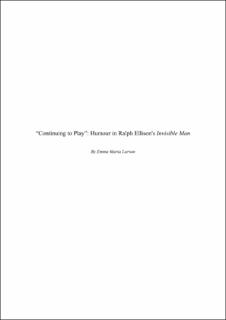| dc.description.abstract | Ralph Ellison’s novel Invisible Man (1952) is sometimes comical, despite many critics’ claims
of the opposite. This master’s thesis provides a close reading of humorous elements in the novel,
demonstrating how humorous framings of sometimes tragic realities of black Americans can be
effective to engage readers’ reflections. The aims are to analyse 1) some historical and
psychological contexts behind these humorous scenes, and 2) Ellison’s use of humour as a
means to critique and question commonly held assumptions about race, and about both
individual and political possibilities and limitations. The Collected Essays of Ralph Ellison
(1994) provide many insightful ideas from Ellison that informs this analysis.
The main argument is that, by using humour, Ellison implicitly asks readers to look
beneath the surface. Readers may laugh at the otherwise unlaughable, and in a disengaged way
reflect upon the underlying meanings, and see the invisibles. In a racially segregated USA
during the 1930s, the naïve, young black protagonist believes that his self-worth depends upon
white men’s judgments. This puts him into situational ironies where his misinterpretations
sometimes become comical. Ellison satirises liberalism’s tradition of paternalism,
communism’s blind insistence upon conformity and discipline, and black nationalism’s
destructive hatred, and shows what hides behind the masked façades. Moreover, Ellison
overturns racial stereotypes by portraying black individuals as witty, eloquent, and autonomous.
He incorporates African American humour like signifying and playing the dozens, together
with folklore, jazz, and the blues. Ellison’s irony plays with different interpretations of laws,
political action, and personal responsibility. In other words, Ellison eloquently incorporates
many different forms of humour which may appeal to different kinds of readers, in his vision
that accepts a pluralistic and diverse America. | |
